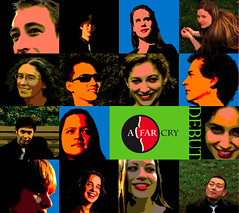Like a lot of accidental discoveries, I first heard about A Far Cry (AFC) on YouTube. From their website, we find that they are a small chamber orchestra comprised of 17 young professional musicians (self-named Criers) who seek "the freedom and flexibility of a string quartet as well as the power and beauty of an orchestra." To achieve this total democracy, they utilize a rotating leadership model with no conductor. After listening to their recording, I was won over by how cohesive and passionate the group performs, which is undoubtedly benefited by them limiting themselves to a select few of the highest caliber. Here is the video of AFC performing the finale to Bartok's Divertimento for Strings that first caught my attention.
The first work on the recording is Osvaldo Golijov's (GALL-e-ov) Last Round. Written as a requiem for Astor Piazzolla, this piece is composed in the style of a boxing match (an homage to Piazzolla's pugilistic aspirations when he was younger). The ensemble, a string octet plus bass, is set up such that the two quartets are on opposite sides, like two boxers in a boxing ring. The bassist stands in between the two groups, separating them like a referee. The only other recording I've heard is the great recording made by the St. Lawrence and Ying String Quartet. I have listened to that recording many times so I was interested to see how I would take in AFC's reading. Much to my surprise, I love their interpretation. By no means do I say this to detract from AFC's talents. I say this because once you listen to the same recording many times, you unconsciously assume accept that that is how the piece should be played. These two groups focus on different aspects of the piece, both make convincing arguments for their case. The two most important skills for a boxer are speed and strength. The SLSQ and YSQ represent the speed, "boxing" with unwavering momentum and precision. AFC represents the strength, bringing the characteristic swagger of a boxer and making every stinging accent and forceful gesture count. Both are very different, yet wholly persuasive. However, it is in the second movement that AFC distinguishes itself from SLSQ/YSQ. In this movement, the ensemble as a whole are unified; gone are the testy confrontations and machismo of the first movement. While the SLSQ/YSQ plays beautifully, they still sound like two separate entities trying to say the same thing. AFC has no trouble in this respect, playing as an organic whole rather than individual constituents. The heighten emotional vein created by this cohesion is carried throughout the duration of the movement, never sounding wary or overdone. The result is a reading that far surpasses the popular SLSQ/YSQ recording.
The second piece offered is the G Minor Concerto Grosso from Handel Op.6 set. Here, AFC plays in a romantically Baroque fashion. They observe certain Baroque practices, such as limited vibrato and clipped staccatos, but are not afraid to extend the melodic line or delve into the more romantic aspects of the music when appropriate. Their playing is always respectful and respectable, making sure they never let their emotions egregiously overstep the boundaries of what is proper in Baroque playing. I especially enjoyed their performance of the second movement's baby fugue where their pinpoint articulation sparkles.
To round out this eclectic program, the AFC records one of the best Tchaikovsky String Serenade recordings I have heard. This comes as no surprise since I have already noted their precision and cohesion as a group. Their playing entices you to sway along in the waltz and reflect introspectively in the muted climax in the elegy. The finale to is high-spirited, exciting, and a great way to finish the recording.
With their great performances and acoustic quality, this recording is highly recommended. I look forward to their next release.

No comments:
Post a Comment